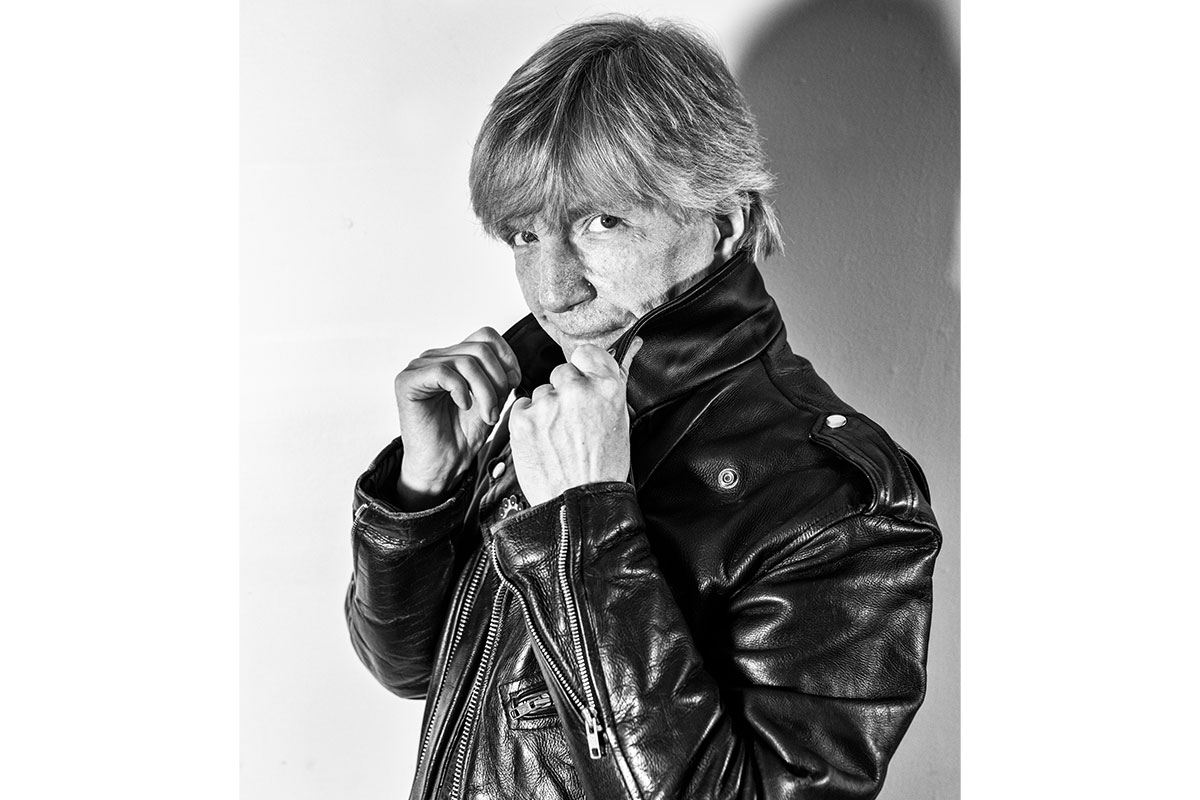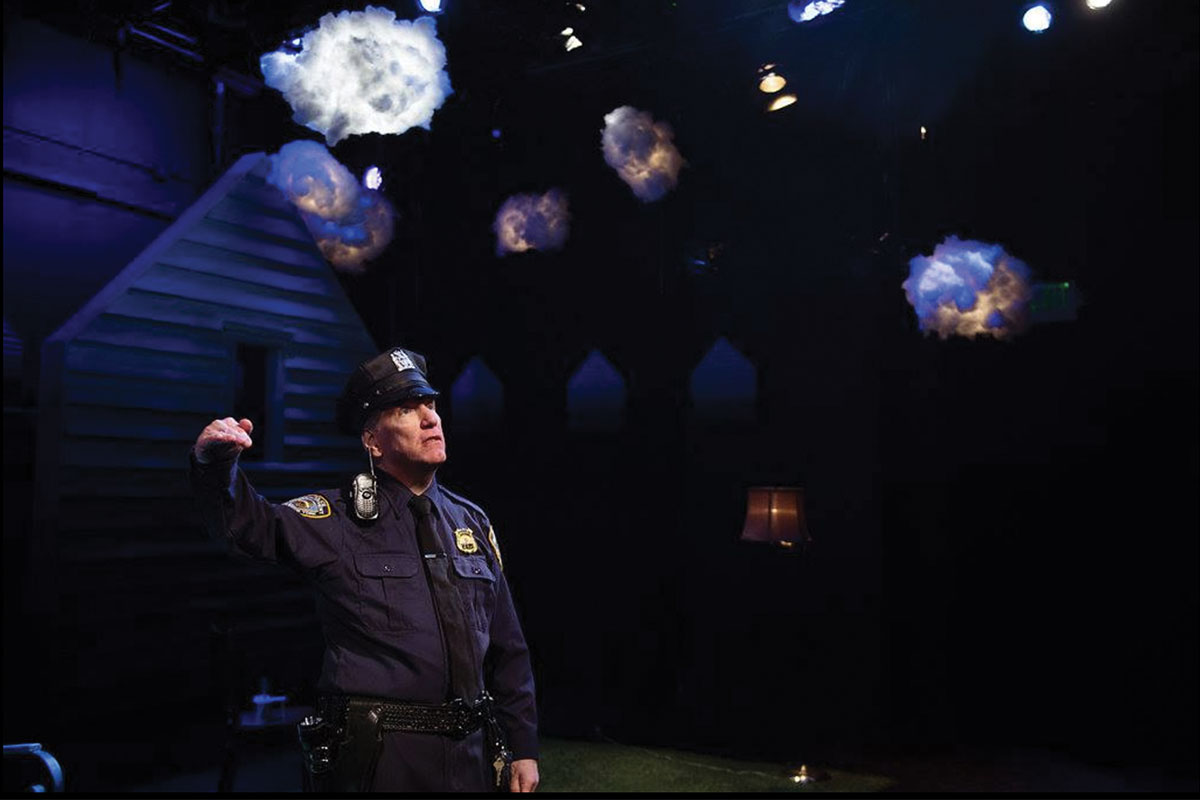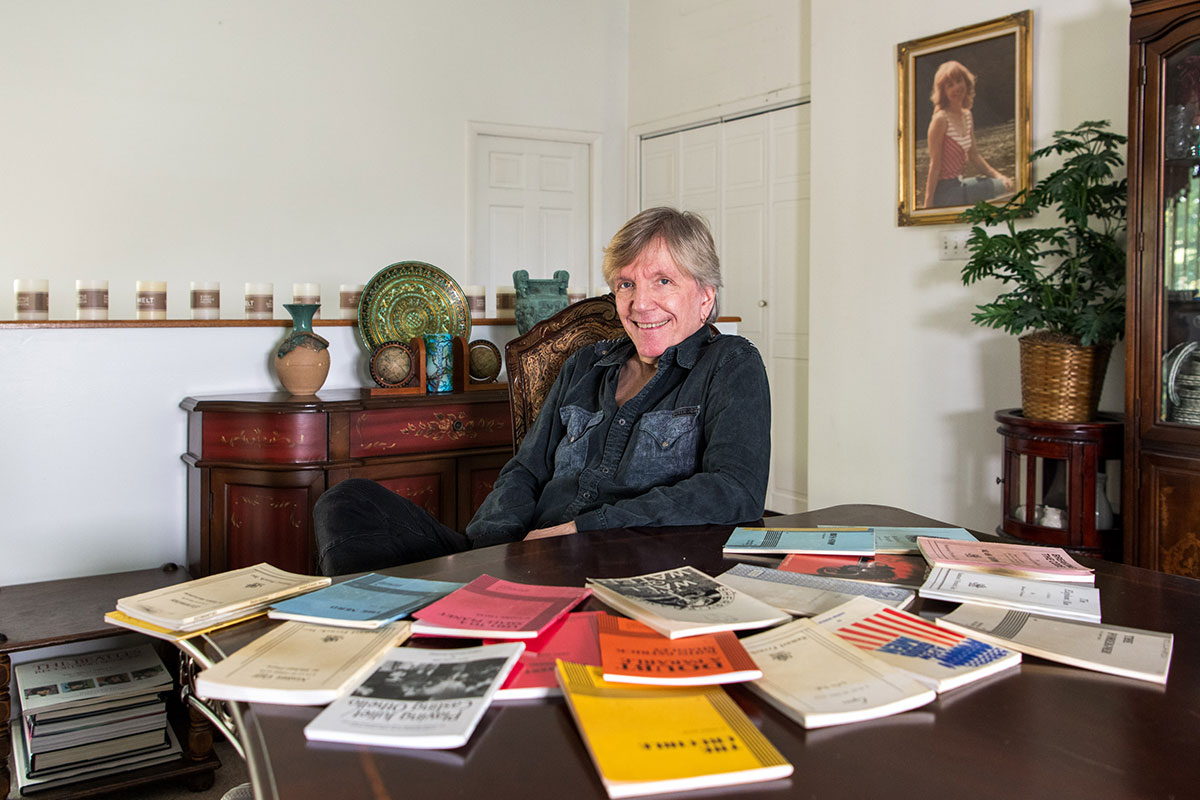He’s been a swashbuckling musketeer, a suave rock star, a misguided religious fanatic who mutilates livestock, a detective in a murder case (four times), a murder suspect, a defiant king, and a hideously deformed victim of a circus freak show. Earlier this year, he was a hopelessly villainous cardinal leading an inept assault during the Spanish Inquisition in the Vienna Theatre Company’s presentation of Monty Python’s Edukational Show.
Clearly, Bruce Alan Rauscher has passed the audition — dozens of them — in an acting career that has spanned an astonishing 50 years. He’s 66 years old and can’t remember a time when he was not acting — or acting up.

It started at the age of 3, recording schtick on reel-to-reel audiotapes to send to his father, who was stationed in Korea with the Army. From this, he learned he liked getting laughs, and he liked getting attention. His comedy act evolved to include magic shows in his early teens “to satisfy that need to perform and be seen,” he says. As a student at T.C. Williams High (now Alexandria City High), he and friends would “make these epic Super 8 movies in the backyard” that fueled his passion for film.
In the mid-1970s, Richard Lester’s Musketeers movies and George Lucas’ Star Wars led to paid public appearances as cosplay D’Artagnan and Luke Skywalker — his resemblance then to the Jedi was better than just passing — and by now Rauscher was taking acting classes at Northern Virginia Community College to deepen his skills. But mostly what he learned was he just needed to do it.
“I got it in my head I just need to go out and dive in, so I dove in,” he says. “And that’s where I really gained what I felt was a decent amount of experience.”
Despite regular acting gigs while working a day job — he had a 30-year career with various federal agencies — Rauscher applied and was accepted to the American Academy of Dramatic Arts in Pasadena, California, in the mid-1980s. But again, he found that school learning wasn’t for him.
“You get all these views and various methods, and everybody’s telling you ‘Try this, do that,’ but I relied on my own thing,” he says. “I’m one of these realism fanatics. I hate when I see actors on stage or in movies just reciting lines. You can tell they were directed to talk and walk that way.” He didn’t need to be taught how to trust his instincts.
Landing in the cast of a community theater production is not easy and requires significant dedication, an unnatural level of commitment, and trained or natural talent that elevates the performer over the others clamoring for the role.
And clamor they do. The Washington Area Theatre Community Honors is an organization that has sent judges to gauge the quality of every aspect of a production since 2000. Last year, WATCH adjudicated 98 shows, 38 of them musicals, presented by 27 companies scattered around the region. Eleven were Northern Virginia companies.
That’s a lot of actors, and some are better than others.

“Bruce is a versatile, unique, and distinctive performer with the kind of instincts and creativity that cannot be taught,” says Jack Marshall, who, as artistic director of the now defunct American Century Theater for 20 years, worked with Rauscher “in crucial roles in many of the productions I’m most proud of,” including King Lear, The Threepenny Opera, and three productions of 12 Angry Men.
He readily cast Rauscher, he says, “because he is one of several superb performers in this area who for various reasons prefers to act for love rather than fame or money.”
Real life rarely conflicted with Rauscher’s acting career. His hours with the federal government provided flexibility and he never married (“just never went down that road,” he says). He separated from his employment — he doesn’t call it retirement — in 2015 “because, mainly, my quote-unquote acting career was starting to take off a little bit. I was getting more and more professional work.”
It was at the same time he signed with Fairfax County–based Triple Threat Talent, an agency founded by entertainment lawyer Paige Gold.
“He has a good sense of humor. He’s thoughtful and serious and he’s very disciplined in terms of doing his work,” Gold says of Rauscher. “He does the unexpected, and he marches to his own drummer in a way that’s not always appreciated in the Washington, DC, area.
“People like that are understood in Los Angeles and New York. Those are hard cities [to win over] but his talents and personality would be appreciated by the producing communities in those cities.”

Rauscher’s longest paid professional run was in the early 2000s at the now-closed Lazy Susan Dinner Theatre in Woodbridge. It was Agatha Christie’s The Mousetrap, for a director who was aware that Rauscher had played the part before — in fact, several times. No audition was necessary, and the show ran for three months.
While the audiences were healthy at the dinner theater, the shows in his career with the biggest turnouts were at the venerable Little Theatre of Alexandria, founded in 1934. LTA, as it is known, has its own building and a devoted, built-in audience that comes to everything. “At LTA, every night was a sellout, and I was blown away,” he says.
His smallest audience? He would rather not name the company, but it was a Saturday matinee. “There were four people in the audience,” he says. In fact, he played more roles in the show — seven — than there were people watching. But the show must go on, and as it happens, two of the spectators were judges for the Helen Hayes Awards, the DC area’s highest theater honors.
While Rauscher didn’t get nominated for that performance, in 2002 he was nominated for a Helen Hayes Award, as Best Actor for his portrayal of Colonel Chipman, the lead prosecutor in the Civil War–era drama The Andersonville Trial for the American Century Theater. Although he’s adept at comic roles, he’s drawn to historical figures such as Chipman and troubled World War II codebreaker Alan Turing in Breaking the Code.
“The role I most cherish was Joseph Merrick in The Elephant Man,” he says. “An absolutely extraordinary person who overcame so much adversity and hardship despite the horrible disease that plagued him.” For that 2003 show with the Port City Playhouse, he was nominated for a WATCH outstanding lead actor award.

Rauscher is taking a rare break this fall to work on editing footage from a Musketeer project shot in the early 1980s and to polish a memoir about his fascination (OK, obsession) with Star Wars. At the time of our interview, he was looking forward to attending fall performances at the Little Theater of Alexandria and the Atlas Performing Arts Center in Washington to see some “phenomenal actors I’ve had the honor of sharing the stage with” — this time as a member of the audience.
As for the future, “I plan to continue to act as long as possible, and as long as directors will cast me.”
Feature image of Rauscher by Jeff Heeney
This story originally ran in our November issue. For more stories like this, subscribe to Northern Virginia Magazine.



